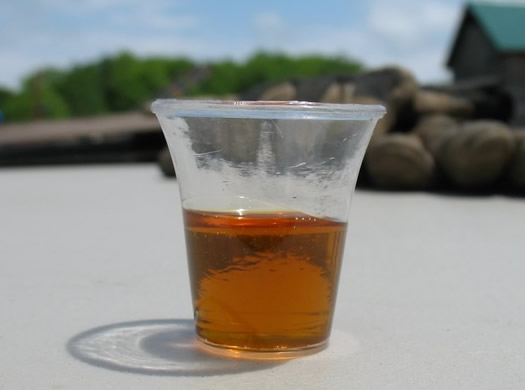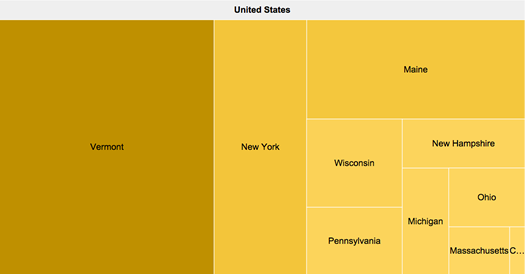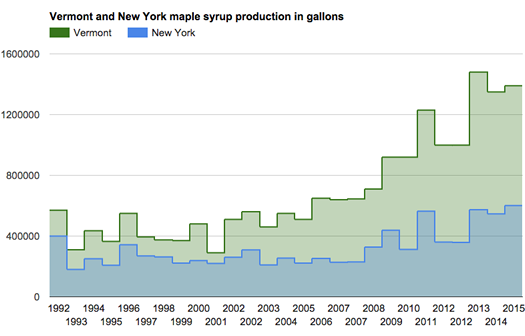Sweet: Record maple syrup production in New York State

New York State produced more than 600,000 gallons of maple syrup this past spring, according to numbers from the US Department of Agriculture. That's good for #2 in the nation. And the Cuomo admin says that's the state's highest total in 70 years.
The sappy record is especially notable because this past maple syrup season was just 26 days long. It was 40 days long when the state set its last "modern" record in 2013.
So, what's responsible for the sweet success? From a Cuomo admin press release:
The amount produced is the most since 1944, the last year before the beginning of a long drop-off in the number of tree taps and the yield of syrup per tap. New York's resurgence began in 2008 as vacuum pumping systems began to replace the metal tree taps and hanging buckets that have signified maple syrup farming for centuries.
The New York State Maple Producers Association estimates that 60 percent of maple farms, including most of the larger farms of more than 500 taps, use vacuum systems to collect raw sap. The modern vacuum system is easier for producers to maintain, which has helped increase production per tap. The average tree tap produced a little more than one quart of syrup this year, though some large farms are seeing yields of a half-gallon or more.
New York State is still far behind Vermont for the nation's top spot for maple syrup production. The Green Mountain State produced 1.39 million gallons this spring, according to USDA. (The tiny state's pancake industry is straining under the pressure to keep up.)
Vermont maple syrup is an interesting case because the state has been experiencing some sort of Maple Miracle over the last decade. So much so that Quebec -- the Saudi Arabia of maple syrup -- has been warily eyeing its neighbor to the south.

This is a "tree map" -- it's kind of like a square pie chart -- that shows what share of the nation's production of maple syrup each state was responsible for in 2015.
It's not just that Vermont has a lot of maple syrup taps -- almost 4,500 this year, about double that of New York State -- it's that it also produces much more maple syrup per tap. This past season Vermont averaged .310 gallons of syrup per tap. New York State produced just .26 gallons per tap. (The national average was .287 gallons per tap.)
Between its huge lead in number of taps, and its high productivity per tap, Vermont's production has surged over the last decade plus. Its three-year average for production in 2000 was 408,000 gallons -- and in 2015 its three-year average is 1.4 million gallons. (Its yield per tap has also grown about 50 percent over that time. New York's yield per tap has increased at about the same rate.)
Apparently this is all making Quebec -- by far the world leader in maple syrup production, and which operates a syrup cartel and strategic reserve (we kid you not) -- just a bit... curious. From a Globe & Mail article last year:
Quebec's powerful maple syrup producer's federation has hired researchers to find out what is fuelling the rapid growth of the industry in Vermont, where production has more than doubled over 13 years.
Even with that dramatic rise, the United States accounts for only 18 per cent of maple syrup production (Vermont trees tap about 40 per cent of the U.S. share), while Quebec accounts for most of Canada's 82 per cent. Still, the Quebec giant is watching the Vermont growth and looking for clues to the sudden upsurge.
"We've hired people to study the evolution of the market," said Paul Rouillard, an executive with the Quebec maple syrup producer's federation, which acts as an industry marketing board and quality enforcement watchdog. "Last year the U.S. had record production. We don't know if they've tapped more, if they had a couple of exceptional seasons, but we're studying it. We have to find ways to make sure we remain the market leader."
So, let us not look upon our neighbors across the eastern border as rivals, but as allies. The real opponent, as ever, is Canada. WE'RE COMING FOR YOU, QUEBEC.
Ahem.

In all seriousness, one of Upstate New York's strength is/can be high-quality agriculture. Apples are a good example -- this is one of the world's premier places for growing the fruit, and the success of the crop here has help nurture businesses beyond orchards, such as Nine Pin Cider in Albany. And maple can be an attractive crop in that it can be "grown" on land that's often not suitable for other crops (hilly, rocky, forest-y).
So, maybe New York can learn a thing or two from Vermont. Both in what the Green Mountain State has already done, and what's still to come: researchers there are looking into some odd -- and potentially productive -- new methods of producing syrup.
And together we can take down Canada.
Earlier on AOA:
+ The art and science of maple sugaring
+ A tour of a maple syrup operation
Say Something!
We'd really like you to take part in the conversation here at All Over Albany. But we do have a few rules here. Don't worry, they're easy. The first: be kind. The second: treat everyone else with the same respect you'd like to see in return. Cool? Great, post away. Comments are moderated so it might take a little while for your comment to show up. Thanks for being patient.
Comments
The cartel keeps Québecois farmers in business even through disastrous years for maple syrup. Yankee farmers are left to twist in the wind. What's more climate change will mean that production will gradually shift northward. America is weak. It doesn't have a chance against la belle province for the short game or for the long.
... said Jason on Jun 25, 2015 at 1:00 AM | link
What really matters is how much can the world market consume at a profitable rate for farmers to keep production going. Investigate the marketing end and where and who is purchasing all that syrup. This is where the Canadian Cartel does more research than on production. But it is also why Vermont can sell it's tradition as the Green Mountain state so easily to consumers. Frankly New York has much more forest that could become maple producing. But is demand there to make it worthwhile, most likely it will be but the investment for farmers is a steep one with plenty of forest management that takes man hours to achieve, with a rather long term to recoup that investment. Incentives are usually the key to get more production going. If New York State Legislative actions could say freeze property taxes on current Maple productive forest that would give room for more farmers to take it up, It is the main down side of any business in this state, we are taxed at the highest rates Nationally in particular on property, yet we have the natural resource to step up production.
On the personal end it is sugar that is twice as rich as cane. But no where near as cheap to produce as corn syrup, which is the artificial syrups big advantage over the real thing. When it comes to perceived taste it is not much different to the kid pouring it on for breakfast, until you wake up one day and get the real syrup taste preference going on for yourself and demand the best for your kids and yourself, that is where tradition has played a role in the market. Like anything in the food bill it comes perceived at a real higher cost so anything that can help to keep it's production cost down will help to continue increasing it's preference as a food item.
... said Lawrence Eger on Jun 26, 2015 at 8:31 AM | link